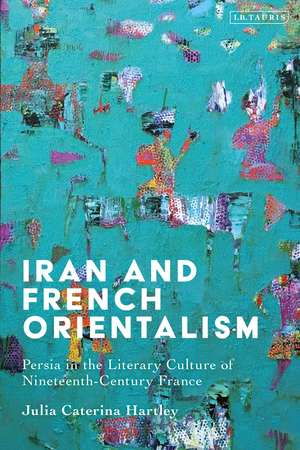Iran and French Orientalism: Persia in the Literary Culture of Nineteenth-Century France
Autor Julia Caterina Hartleyen Limba Engleză Hardback – 27 dec 2023
Preț: 512.04 lei
Preț vechi: 732.17 lei
-30% Nou
Puncte Express: 768
Preț estimativ în valută:
97.98€ • 106.76$ • 82.56£
97.98€ • 106.76$ • 82.56£
Carte tipărită la comandă
Livrare economică 23 aprilie-07 mai
Preluare comenzi: 021 569.72.76
Specificații
ISBN-13: 9780755645596
ISBN-10: 0755645596
Pagini: 296
Dimensiuni: 156 x 234 mm
Greutate: 0.59 kg
Editura: Bloomsbury Publishing
Colecția I.B.Tauris
Locul publicării:London, United Kingdom
ISBN-10: 0755645596
Pagini: 296
Dimensiuni: 156 x 234 mm
Greutate: 0.59 kg
Editura: Bloomsbury Publishing
Colecția I.B.Tauris
Locul publicării:London, United Kingdom
Caracteristici
Analyses French writing on Iran in light of authors' sources (ie: Persian literature, Islamic theology, Iranian cultural customs, Iranian architecture), offering a new transnational perspective on nineteenth-century French culture.
Notă biografică
Julia Hartley is a Lecturer in Comparative Literature at the University of Glasgow. She was previously Laming Fellow at the Queen's College Oxford and Edward W. Said Visiting Fellow at Columbia University. She is the author of Reading Dante and Proust by Analogy (2019) and peer-reviewed articles in Iranian Studies and Nineteenth-Century French Studies.
Cuprins
IntroductionIran in Nineteenth-Century France: Competing NarrativesIran and OrientalismBeyond the Paradigm of DifferenceThe Politics of GenreChapter 1: PoetryTranslation and Poetic InnovationFrom Paris to 'Persia' and Back Again (Hugo, Théophile Gautier, Noailles)Persian Poems Made in France (Renaud, Lahor/Cazalis)Intertextuality and Universalism: The Case of 'Les Roses de Saadi' (Desbordes-Valmore)ConclusionChapter 2: History and Historical FictionRewriting Human History 'Nos parents, les Aryas' (Arthur de Gobineau, Ernest Renan, Jules Michelet) The Persian Alexander: Hybridity and Queer (Anti-)Imperialism (Judith Gautier) Ancient History? Iran as Mirror for French Feminism (Jane Dieulafoy) ConclusionChapter 3: Travel-Writing'Tout chemin ne conduit pas en Perse' Defining the Persians Among Women: Scenes from the HaremUnderstanding Shiism 'Esfahan, Nesf-e Jahan'Remembering 'the Great of the Earth' Plagued by the WestBooks versus RealityConclusion Chapter 4: Performing ArtsOrientalism and the Stage A Tale of Two Peris : Iran, the Imaginary Orient, and Ballet (Théophile Gautier, Paul Dukas)Of Poets, Prophets, and Kings: French Opera's love affair with Iranian men (Lalla Roukh, Le Mage, and Thamara)A Puppet Play about Omar Khayyam (Maurice Bouchor) Rebuilding Susa: Jane Dieulafoy and Camille Saint-Saëns's 'Parysatis' (1902) Conclusion Conclusion
Recenzii
Clever, exciting, timely: Julia Hartley's wonderful book completely reinvents the way we think about Iran and France. By revealing the vast array of devices, ideas, styles, and writing that are all too often dismissed as mere "Orientalism ", she demonstrates Iran's exemplary place at the heart of nineteenth century literary, historical, musical, and cultural production. She takes us on marvelous trajectories that show how Oriental themes are good to think with in the strong literary sense, and that figures as varied as Hugo, Gautier, Michelet, Dieulafoy, Dukas, and Bibesco aren't just responding to or participating in imperialism; they are also reckoning with Iran's rich literary heritage and each other.
Hartley's new book makes a resounding case for the specificity of Iran as perceived and instrumentalised within nineteenth-century French discourse. Written in an elegantly lucid style, this is an important contribution to French transcultural studies that significantly nuances any notion of a monolithic Orientalism.
Hartley's new book makes a resounding case for the specificity of Iran as perceived and instrumentalised within nineteenth-century French discourse. Written in an elegantly lucid style, this is an important contribution to French transcultural studies that significantly nuances any notion of a monolithic Orientalism.
